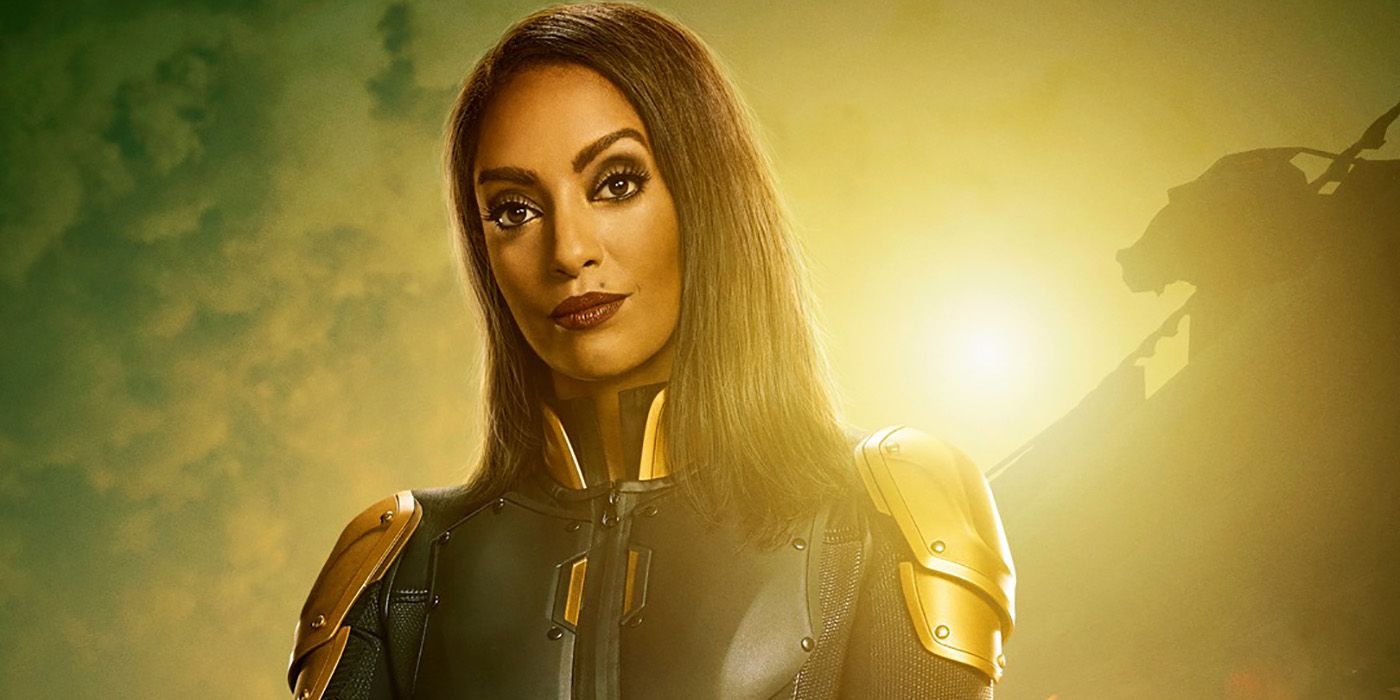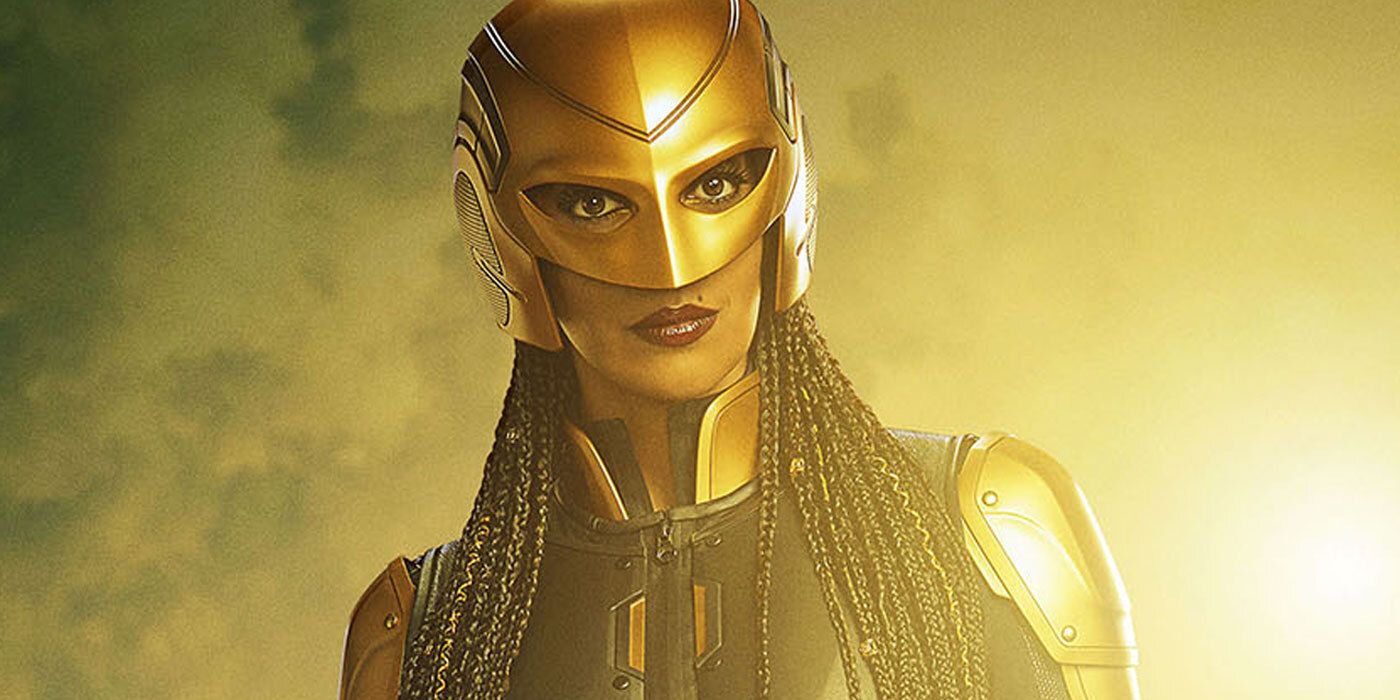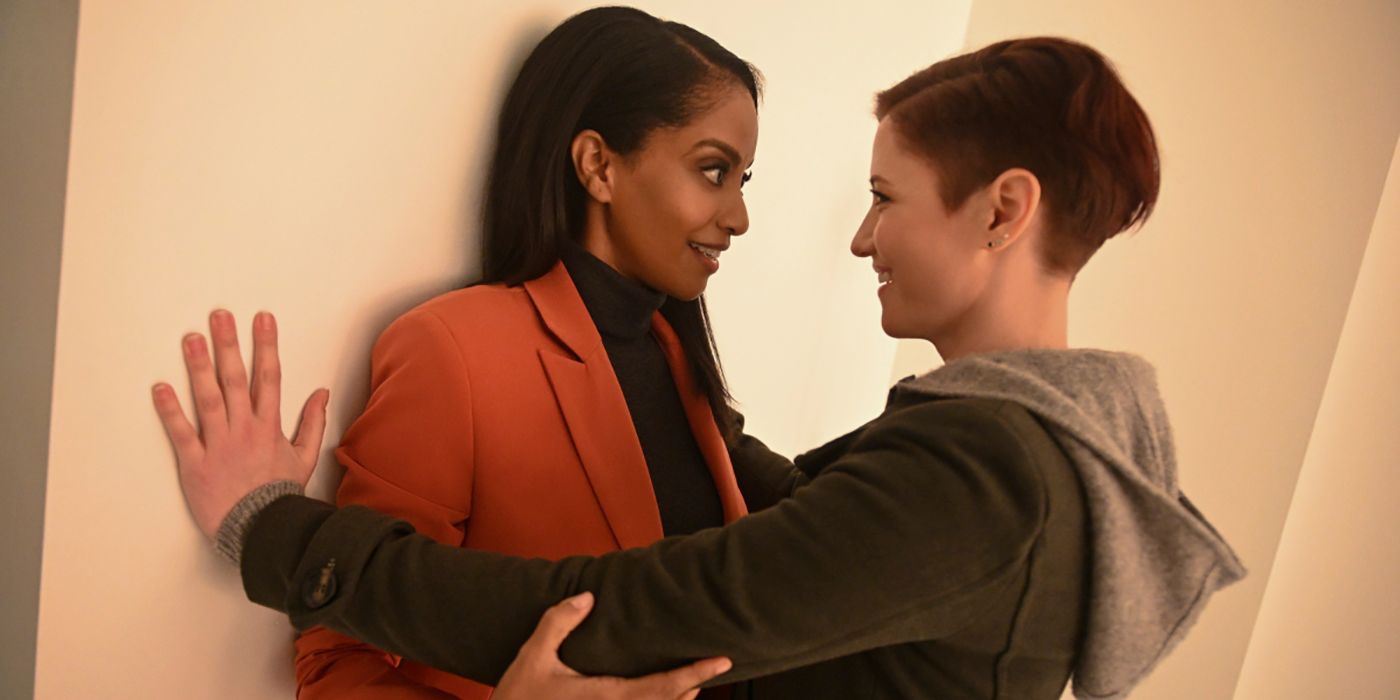SPOILER WARNING: This article contains major spoilers for "Blind Spots," the latest episode of Supergirl Season 6.
Team Supergirl has a new hero. In "Blind Spots," the latest episode of Season 6, Kelly Olsen stepped up and into the Guardian mantle her brother James left behind, albeit with a few updates. After her cries for help went unheard by her teammates, she was inspired to stand up for those who feel voiceless in their communities -- but that isn't the only thing that makes this a landmark episode. After all, "Blind Spots" also made Supergirl star Azie Tesfai the first Arrowverse star to pen an episode since Arrow launched back in 2012.
Speaking to CBR, Tesfai stressed the importance of making Kelly's story an arc instead of a one-off episode. She explained her decision to introduce difficult questions without answers and how her writing journey ran parallel to Kelly's decision to become Guardian. She broke down Kelly's final scene with Alex, as well as what made it feel "very real" for her and her co-star Chyler Leigh. She also shared director David Ramsey's contributions to the episode, discussed how "Blind Spots" breaks Supergirl's usual formula and more.
CBR: Your episode deals heavily with Orlando and Joey's storyline. At what point did you begin to develop the story for this episode? Did you plant the seeds for that story arc, or was that just part of your foundation?
Azie Tesfai: Yeah, both J. [Holtham] and I felt like it had to be told through different characters; it didn't feel authentic. There was a moment where we thought we would explore this through Kelly, and we just haven't in years. So to all of a sudden do that didn't feel right.
Once the decision was made that she was going to be a social worker, that felt like the most perfect environment to use her as a tool to highlight other people's stories. Then I just personally fell in love with the actors that play Orlando and [Joey]. I think there's such brilliant actors and wonderful people and they will recur on the show, thanks to this episode, because they're so great in it. That made me really happy.
It needed to feel like an arc, and that was a conversation that we had. It needed to feel like not a one-off, and also that we really invest in their stories, not just to serve this episode, but as characters in our show.
The episode deals with some extremely difficult subjects and complex ideas about race and allyship. How challenging did you find it to express yourself this way?
It was challenging. I mean, I think, once we got approval -- it being an arc, again, was very important to me. Then once I realized that we were stepping away from it in Episode 11, the thought of doing a backtrack, so it still felt like a continuation, felt like the only way to do it. That was something we've never done, so once we got approval that we could do that, it just felt like a totally different thing.
So that gave us an excuse to -- we've never gone outside of Supergirl's perspective. So that first act, seeing everything through Kelly's perspective, was something the shows -- and I don't know if any of the superhero shows have really done. That kind of gave us the permission to not have to play totally by the rules of the structure of the show.
Then also, it is formulaic, these shows: you have a problem, you fight the bad guy, you reflect on it, and then everyone's happy. That couldn't exist with this story. There's no solution. It's like opening a bunch of cans of worms, and then everyone has to sit uncomfortably, which is not the format of the shows.
So there was a real understanding from the jump that this was going to be different. I think that gave us leeway to not have to follow all the rules of a show like this in one hour, and that we didn't solve anything. We just presented a lot of questions and then walked away.
On the flip side, what did the superhero lens allow you to do with this conversation, that perhaps another genre couldn't?
Yeah, I think what's interesting is Kelly being a social worker and a superhero, which -- in my perspective -- are both interchangeable, right? The work that she's doing with these kids is so admirable, and then it's almost as if the superhero is just an add-on to helping her do that work, which felt really important, especially because she is the civilian who steps into this power, which I find always more inspiring and more relatable, in terms of like, "I could be that," as opposed to someone who's lborn with powers. It's like, "I couldn't necessarily do that!"
But the journey for me, also, personally, stepping into writing and storytelling while Kelly was stepping into being a superhero, it's like two worlds that I hadn't been into, but wanted to feel empowered by. So we had a parallel journey kind of going through these episodes, funny enough, and she led the way and and was empowered, and then I felt empowered. So I've never had that before with the character, where we went through the same work together on screen and then in my personal life, and I got to write it. It was very meta, I guess.
Kelly finds herself taking on the Guardian mantle at a really critical point in her struggle with both Team Supergirl and Councilwoman Rankin. How does that influence the way she views the mantle? What does that moment mean to her?
I think it crystallizes for her that -- again, which is parallel in my life and storytelling -- her specific perspective is important and needed, especially when you come into a group of people who are such big superheroes and have their identity pretty solidified and you're trying to figure out and find your way, similar to me coming into an established show. Once you do figure out what your purpose is and validate that, which is hard to do -- because especially as women, I think sometimes we're like, "I'm just gonna sit back and... I don't want to bother anyone." Once you stand and like, "No, my perspective is different and valuable to share," that's really empowering.
So I think for her, she struggles and stumbles for a bit, but once she has purpose and purpose of herself and purpose to fight for people that she believes in, Kelly soars as herself and Guardian. That is so exciting, and I relate to so much. Once you do have clarity in who you are and what you want to do and you stand in that, you become unstoppable.
David Ramsey was obviously a huge part of bringing this episode to life, both as its director and its guest star. What was something he contributed to the story that surprised you?
It's funny -- he's literally texting me right now as we're talking! [laughs] I just see his name popping up on my phone. We're very good friends, still, now. He's in Vancouver directing, and he's like, "When are you back? Let's have dinner!"
But our friendship, I think, was really surprising. He came up to direct some of the shows and we had a dinner. I had his phone number, because I actually met him at Upfronts my first season of the show, and he came up to me at the after party and was like, "Here's my phone number. I'm a resource to you." Like, "I'm here for you." Very similar to Diggle.
I just didn't listen, kind of similar to Kelly. I was like, "Yeah, okay," but then once it started, the network connected us and we went to dinner, and we actually did a weekly -- every Saturday, we would do a dinner together in Vancouver. This was two months before we started filming.
So we had formed such a solid bond. His perspective on his experience is very different than mine, very different than J., who I co-wrote the episode with, so to have his personal experience and to share that with me and then to try to integrate that into the script, through either Diggle or through Orlando and through our guest stars and keep it honest. Then he was like, "This is what Diggle would and won't do," so also honoring that he's played this character for so long and making adjustments and rewrites once he came up in the authenticity of Diggle.
But he was my rock. I think I was surprised -- I have close friends, but there are people that have taken decades for me to get close to and we went through war together. We wanted the same things out of the episodes and we fought to keep so much of the same stuff. When I was tired or emotional, he was there to pick me back up.
It's funny now, looking back and seeing how he was with Kelly, there was some real crossing in terms of that support and that guidance and him being on Arrow, which was the OG Arrowverse show, and then him directing first. So me stepping into writing, there was a lot of Diggle/Kelly dynamic between Ramsey and I. I just felt really grateful. He'll be a friend of mine for life. We really went through this intense experience together.
Also, most of the scenes are just him and I, and it felt like an independent movie because he would go check the frame, I would edit a line, and then we would normally have to tell someone but we just told each other. You know, it's like, "I want to stay up here," and then he goes as the director, "That's fine. I want to say this line," and I'm like, "You can do that," and then we would film it. It felt very small. It's a credit to our producers, who gave Ramsey and I so much trust and J. so much trust. So it was kind of magical and oddly serene, the environment, because it was so small.
Now that Kelly has released this emotional pressure valve and stepped into Guardian's shield, how does that impact her relationship with Alex, specifically?
Funny enough, when we were looking at the end of the show, I was like, "Okay, again, it has to be kind of uncomfortable and there can't be a solve." A lot of the conflict that Kelly and Alex have had has been outside of their relationship, whether it's her past or Alex's past. It hasn't really been between each other. When we have had it, they fixed it very quickly and beautifully and they're goals, so I'm fine with that.
But what does it look like in a healthy relationship where there is no fix? How do you handle that? So first of all, that scene with Chyler [Leigh], it was the first thing we shot of the whole episode, at like 7 o'clock in the morning, 8 o'clock in the morning, and we were sobbing during the rehearsal. Ramsey was like, "You guys have got to save it!"
We cried every single take because her and I have such a great working relationship and have so much love for each other and it is uncomfortable when you love someone -- there was so much truth in that. Her and I are close enough where she knows my personal experiences and things that I've been through, and it was very real. A lot of this episode was very real. So you know, when Alex is saying, "I hate seeing your pain. I want to be there for you," that was Chyler saying that to me. So it was very blurry, which made it such a beautiful, cathartic experience in so many ways.
Then, after the episode, just Ramsey and I doubling down on, "Please don't delete --" You know, we're an action show. We don't have a lot of time when there's not lines or words or somebody fighting. The scene before that, or that piece before that, where she's wrapping her hair, those quiet moments are such a big part of holding the space and things we're talking about. I felt really grateful that they did keep it because that's nothing that we've ever done on our show before, and that scene specifically feels so different.
Actually, that scene was not touched from the first time it was written all the way through. Everything else is adjusted. Every notes call, I was scared they were going to touch it and they would end before that scene. So pretty much, the initial writing of it is what made it to air, which was such a gift.
What do you hope Supergirl fans take away from this episode?
You know, there's the villain of the episode, which there's certain people that you just can't have these conversations with and that you have to fight against. Then there's the nuances of your intimate partners or people that you think can help you make real change, which is Supergirl in this, and what are those conversations look like? There's this misconception that they're supposed to be easy, and they're not. They're painful, and they're uncomfortable, and that's right, and that's okay, and to not shy away from having them.
I also hope that we have a Black superhero in this episode that's a badass woman and I hope that a lot of people feel seen in it. I feel so honored and lucky that I got to embody that. I know how much she means to the fans and the fans means so much to me. So I'm excited for them to see Guardian in her full glory.
Supergirl airs Tuesdays at 9 pm ET/PT on The CW.



